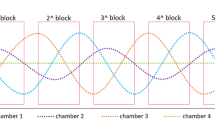Abstract
Temperature affects human cognition, emotion, and behavior in important ways, yet exactly how ambient temperature exerts its influences on complex product choices remains largely unknown. In this research, we examine how relatively warm versus cool temperatures, both within a comfortable range and commonly experienced, can affect people’s decision quality in complex choices. In a series of three experiments, we demonstrate that warm (vs. cool) temperatures prompt affective processing, which then leads to better performance in complex choices. Consumers and companies need to take ambient temperature into account to create optimal environments for complex decision-making.
Similar content being viewed by others
References
Anderson, C. A. (1989). Temperature and aggression: ubiquitous effects of heat on occurrence of human violence. Psychological Bulletin, 106(1), 74–96.
Avnet, T., Pham, M. T., & Stephen, A. T. (2012). Consumers’ trust in feelings as information. Journal of Consumer Research, 39(4), 720–735.
Baker, J., & Cameron, M. (1996). The effects of the service environment on affect and consumer perception of waiting time: an integrative review and research propositions. Journal of the Academy of Marketing Science, 24(4), 338–349.
Bettman, J. R., Luce, M. F., & Payne, J. W. (1998). Constructive consumer choice processes. Journal of Consumer Research, 25(3), 187–217.
Campbell, D. J. (1988). Task complexity: a review and analysis. Academy of Management Review, 13(1), 40–52.
Cheema, A., & Patrick, V. M. (2012). Influence of warm versus cool temperatures on consumer choice: a resource depletion account. Journal of Marketing Research, 49(6), 984–995.
Cheng, T. (2012). http://www.chinanews.com/ga/2012/08-06/4084711.shtml.
Denes-Raj, V., & Epstein, S. (1994). Conflict between intuitive and rational processing: when people behave against their better judgment. Journal of Personality and Social Psychology, 66(5), 819–829.
Ellis, H. D. (1982). The effects of cold on the performance of serial choice reaction time and various discrete tasks. Human Factors, 24(5), 589–598.
Epstein, S. (1994). Integration of the cognitive and the psychodynamic unconscious. American Psychologist, 49(8), 709–724.
Epstein, S., Pacini, R., Denes-Raj, V., & Heier, H. (1996). Individual differences in intuitive–experiential and analytical–rational thinking styles. Journal of Personality and Social Psychology, 71(2), 390–405.
Finucane, M. L., Alhakami, A., Slovic, P., & Johnson, S. M. (2000). The affect heuristic in judgments of risks and benefits. Journal of Behavioral Decision Making, 13(1), 1–17.
Gilovich, T., Griffin, D., & Kahneman, D. (Eds.). (2002). Heuristics and biases: the psychology of intuitive judgment. Cambridge: Cambridge University Press.
Hancock, P. A. (1986). Sustained attention under thermal stress. Psychological Bulletin, 99(2), 263–281.
Hancock, P. A., & Warm, J. S. (1989). A dynamic model of stress and sustained attention. Human Factors, 31(5), 519–537.
Hancock, P. A., Ross, J. M., & Szalma, J. L. (2007). A meta-analysis of performance response under thermal stressors. Human Factors, 49(5), 851–877.
Hayes, A. F. (2012). An introduction to mediation, moderation, and conditional process analysis: a regression-based approach. New York: Guilford.
Hocking, C., Silberstein, R. B., Lau, W. M., Stough, C., & Roberts, W. (2001). Evaluation of cognitive performance in the heat by functional brain imaging and psychometric testing. Comparative Biochemistry and Physiology Part A: Molecular & Integrative Physiology, 128(4), 719–734.
Ijzerman, H., & Semin, G. R. (2009). The thermometer of social relations. Psychological Science, 20(10), 1214–1220.
Janis, I. L., & Mann, L. (1977). Decision making: a psychological analysis of conflict, choice, and commitment. New York: The Free Press.
Kahneman, D. (2003). A perspective on judgment and choice: mapping bounded rationality. American Psychologist, 58(9), 697–720.
Larrick, R. P., Timmerman, T. A., Carton, A. M., & Abrevaya, J. (2011). Temper, temperature, and temptation: heat-related retaliation in baseball. Psychological Science, 22(4), 423–428.
Lee, L., Lee, M. P., Bertini, M., Zauberman, G., & Ariely, D. (2015). Money, time, and the stability of consumer preferences. Journal of Marketing Research, 52(2), 184–199.
Mikels, J. A., Maglio, S. J., Reed, A. E., & Kaplowitz, L. J. (2011). Should I go with my gut? Investigating the benefits of emotion-focused decision making. Emotion, 11(4), 743–753.
Occupational Safety & Health Administration Technical Manual (2015). https://www.osha.gov/dts/osta/otm/otm_toc.html.
Payne, J. W. (1976). Task complexity and contingent processing in decision making: an information search and protocol analysis. Organizational Behavior and Human Performance, 16(2), 366–387.
Payne, J. W., Samper, A., Bettman, J. R., & Luce, M. F. (2008). Boundary conditions on unconscious thought in complex decision making. Psychological Science, 19(11), 1118–1123.
Ramsey, J. D., Burford, C. L., Beshir, M. Y., & Jensen, R. C. (1983). Effects of workplace thermal conditions on safe work behavior. Journal of Safety Research, 14(3), 105–114.
Rosenthal, E. (2011). Oh, to be warm in summer’s heat. The New York Times, August 27, http://www.nytimes.com/2011/08/28/sunday-review/oh-to-be-warm-in-summers-heat.html?_r=0.
Shiv, B., & Fedorikhin, A. (1999). Heart and mind in conflict: the interplay of affect and cognition in consumer decision making. Journal of Consumer Research, 26(3), 278–292.
Slovic, P., Finucane, M., Peters, E., & MacGregor, D. G. (2002). The affect heuristic. In T. Gilovich, D. Griffin, & D. Kahneman (Eds.), Heuristics and biases: the psychology of intuitive judgment (pp. 397–420). New York: Cambridge University Press.
Williams, L. E., & Bargh, J. A. (2008). Experiencing physical warmth promotes interpersonal warmth. Science, 322(5901), 606–607.
Wood, R. E., Mento, A. J., & Locke, E. A. (1987). Task complexity as a moderator of goal effects: a meta-analysis. Journal of Applied Psychology, 72(3), 416–425.
Zwebner, Y., Lee, L., & Goldenberg, J. (2013). The temperature premium: warm temperatures increase product valuation. Journal of Consumer Psychology, 24(2), 251–259.
Funding
This study received financial support from the National Natural Science Foundation of China (71302024) and the Fundamental Research Funds for the Central Universities.
Author information
Authors and Affiliations
Corresponding author
Appendices
Appendix 1: Stimuli for study 1
Appendix 2: Stimuli for rather simple lottery choice task
Rights and permissions
About this article
Cite this article
Tong, L., Zhu, R.(., Zheng, Y. et al. Warmer or cooler: the influence of ambient temperature on complex choices. Mark Lett 29, 337–350 (2018). https://doi.org/10.1007/s11002-018-9461-x
Published:
Issue Date:
DOI: https://doi.org/10.1007/s11002-018-9461-x




